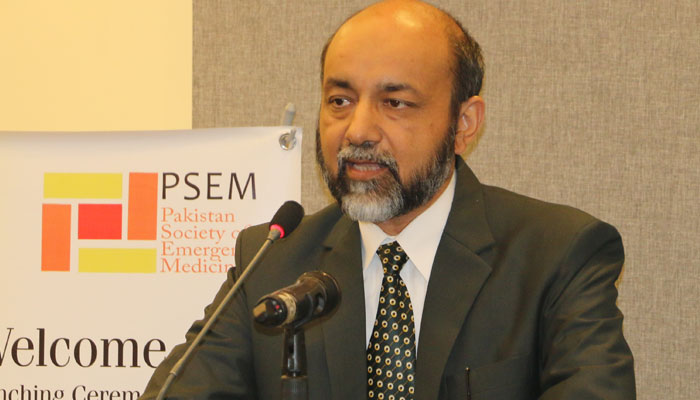Call for more emergency medicine experts to deal with growing trauma cases
There is an urgent need to completely transform the concept of emergency medicine in Pakistan and increase the number of trained emergency medicine physicians and surgeons to deal with the growing number of emergency and trauma cases in Pakistan.
“There should be two-year certification, a one-year diploma or MCPS in emergency medicine. A local curriculum for the needs of Pakistan should be created. We need a unified training system. The government should introduce trained physicians to manage the emergencies, especially in rural areas, and streamline all the training activities to address the needs of Pakistan,” said keynote speaker Dr Abdus Salam Khan, MD FACP, president of the Pakistan Society of Emergency Medicine on Saturday.
He was addressing the audience at the 3rd Annual Symposium on “Emergency Medicine themed Shaping the Future of Emergency Medicine in Pakistan”, hosted by Dr Ziauddin Hospital and Ziauddin University.
Speaking at the conference about the pulmonary embolism (PE), Dr Munawar Khursheed, associate professor and director of the Emergency Department NICVD, said: “Under massive pulmonary embolism, 50 per cent people have chances to die within 30 minutes, 70 per cent within one hour and more than 85 per cent within six hours of the onset of symptoms. The pulmonary embolism is frequently undiscovered until autopsy. The interval from the onset of symptoms to death is relatively short. Early evaluation and prompt treatment is very important especially in massive pulmonary embolism.”
Talking about unstable pelvic trauma, Prof Amin Chinoy, head of the orthopedic department, Indus Hospital, said: “Wearing seatbelts can reduce the risk of fatalities to front seat occupants by 45 per cent since the probability of severe head injury and ejection from the vehicle is lower. Chances of fatal/major injuries to head, neck, chest and abdomen are lesser. Except whiplash injury, other injuries are of less severity.”
“Three per cent of all fractures in the emergency department are the cases we receive of pelvic fractures. We also get to face 15 per cent patients from motorcycle crashes, 10-30 per cent from falls, 15 per cent from car vs. pedestrian and crush injuries are five per cent. Associated injuries including chest injury (63 per cent), long bone fracture (50 per cent), head and abdominal injury (40 per cent), spine fractures (25 per cent) and urogenital injuries in 12-20 per cent. Survivour rate is 1.89 additional injuries, non-survivors: 2.95 additional injuries. Only two in 14 deaths (14 per cent) are directly attributable to pelvic injury.” he added.
Dr Nadeem Ullah khan, associate professor, Department of EM, Aga Khan University, on the topic of ‘Principles of Palliative Care in Emergency Department’, while discussing the approaches to care for the dying patients, said that when you realise that someone is dying, communicate sensitively with them and their family. Involve them in decisions. Support them and their family creates an individual plan of care that includes nutrition hydration and adequate pain relief.
Other speakers notified that emergency physicians have to know situations of their emergency departments and handle their patients accordingly, especially in a country like Pakistan. They said that we have to be very active in this field to save our people’s lives, we have to be careful, and we have to take decisions wisely, because it’s not about our job; it is about patient safety.
Earlier, in the welcome address, Prof Mahmud Jilani, chairperson EM Dr Ziauddin Hospital, and Prof Abbas Zafar, dean faculty of health sciences, Dr Ziauddin Hospital, said conferences like these are a very good source of awareness of the importance of emergency medicines and its future-shaping in Pakistan. Ziauddin University is aiming towards achieving excellence in the field of medical and emergency medicine, he said.
-
 AI Copyright Battle: ByteDance To Curb Seedance 2.0 Amid Disney Lawsuit Warning
AI Copyright Battle: ByteDance To Curb Seedance 2.0 Amid Disney Lawsuit Warning -
 Savannah Guthrie In Tears As She Makes Desperate Plea To Mom's Kidnappers
Savannah Guthrie In Tears As She Makes Desperate Plea To Mom's Kidnappers -
 Canada’s Defence Industrial Strategy Targets 125,000 Jobs And Export Growth
Canada’s Defence Industrial Strategy Targets 125,000 Jobs And Export Growth -
 Tre Johnson, Former NFL Guard And Teacher, Passes Away At 54
Tre Johnson, Former NFL Guard And Teacher, Passes Away At 54 -
 Jerome Tang Calls Out Team After Embarrassing Home Defeat
Jerome Tang Calls Out Team After Embarrassing Home Defeat -
 Cynthia Erivo Addresses Bizarre Rumour About Her Relationship With Ariana Grande
Cynthia Erivo Addresses Bizarre Rumour About Her Relationship With Ariana Grande -
 Prince Harry, Meghan Markle Spotted Cosying Up At NBA All-Star Game
Prince Harry, Meghan Markle Spotted Cosying Up At NBA All-Star Game -
 Lady Gaga Explains How Fibromyalgia Lets Her 'connect With People Who Have It'
Lady Gaga Explains How Fibromyalgia Lets Her 'connect With People Who Have It' -
 Metro Detroit Weather Forecast: Is The Polar Vortex Coming Back?
Metro Detroit Weather Forecast: Is The Polar Vortex Coming Back? -
 Daniel Radcliffe Reveals Surprising Way Fatherhood Changed Him
Daniel Radcliffe Reveals Surprising Way Fatherhood Changed Him -
 ‘Disgraced’ Andrew At Risk Of Breaking Point As Epstein Scandal Continues
‘Disgraced’ Andrew At Risk Of Breaking Point As Epstein Scandal Continues -
 Alan Cumming Shares Plans With 2026 Bafta Film Awards
Alan Cumming Shares Plans With 2026 Bafta Film Awards -
 OpenClaw Founder Peter Steinberger Hired By OpenAI As AI Agent Race Heats Up
OpenClaw Founder Peter Steinberger Hired By OpenAI As AI Agent Race Heats Up -
 Kate Middleton's Reaction To Harry Stepping Back From Royal Duties Laid Bare
Kate Middleton's Reaction To Harry Stepping Back From Royal Duties Laid Bare -
 Rose Byrne Continues Winning Streak After Golden Globe Awards Victory
Rose Byrne Continues Winning Streak After Golden Globe Awards Victory -
 Ice Hockey Olympics Update: Canada Stays Unbeaten With Dominant Win Over France
Ice Hockey Olympics Update: Canada Stays Unbeaten With Dominant Win Over France




